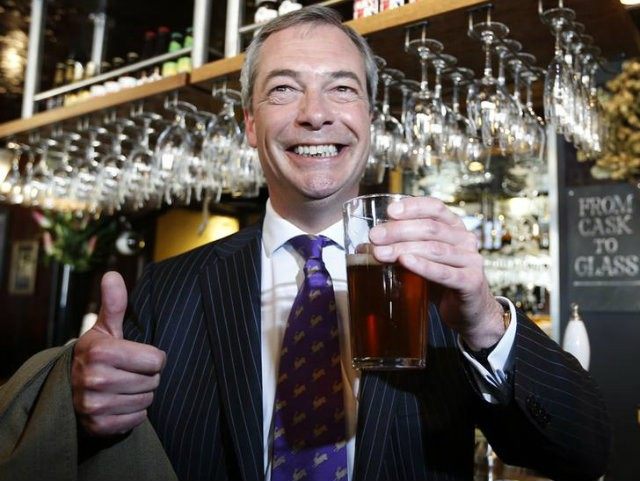Nigel Farage has revealed that he almost died from testicular cancer after the NHS took two months to diagnose his symptoms.
In his autobiography, The Purple Revolution, serialised in The Telegraph, Mr Farage reveals how on Boxing Day 1986 he rushed into his local pub, The Queen’s Head, to catch last orders when he suffered a shooting pains from down his left hand side. In true Farage style, he described how he was “in absolute agony” but “tried to grin and bear in and ordered another pint.”
But after two days he was still in “real pain” and said at that point he realised something was “very badly wrong”.
“On Dec 28, I went to the Accident & Emergency Department in Bromley. Several doctors examined me — registrars, locums, all that lot — and they came to the conclusion that I had a twisted testicle. I would need an immediate operation, they said. I was taken by ambulance to hospital in Farnborough, Hants, where I was re-examined by another four doctors. It was pretty painful.
“An Indian doctor told me that the Bromley doctors had got it all wrong: I had an infection. I was to go home and take a heavy dose of antibiotics. I did not need an operation after all. A few weeks went by and the pain was just as bad. All the time, my left testicle was getting markedly larger.”
After six weeks of being on antibiotics, with the pain increasing and with walking becoming difficult, Mr Farage went to see his GP, who arranged for him to see a consultant that day. “To say this consultant was disinterested would be an understatement” Farage said, quipping with typical black humour, “Perhaps he had a round of golf booked for the afternoon.”
His advice to Farage was not what the city trader wanted to hear: “Keep taking the antibiotics,” he said.
It was at this point Farage called his office and spoke to one of his bosses, who reminded him that he was covered by private medical insurance and that he should use it. So the next day he saw a private GP in the City who arranged for him to have a scan. After weeks of being fobbed off, Farage said he was immediately given an appointment to see a top surgeon, Jerry Gilmore, in Harley Street. Both he and his then girlfriend, were extremely worried when the GP said, “You’re going straight there, aren’t you, not stopping at the pub on the way, are you?”
And Farage did indeed bypass any local watering holes, and after an examination and a scan the consultant came to the conclusion he had a tumour which would require removal.
“I was not happy about this at all,” he wrote. “It doesn’t matter how much people tell you that you have a surplus with two, I certainly didn’t want one of them removed.”
The consultant confirmed it was cancer.
But that was not the end of the story, with doctors convinced that a tumour that size, having been left untreated, would doubtless have spread to other areas of his body including his lungs and stomach – an almost certain death sentence.
The 21 year old found the situation he was in “astonishing” having been “fobbed off” in his own words, by one NHS doctor to the next, apart from his own GP – who he says he stayed with until his retirement – from being told he was probably riddled with cancerous tumours.
In his book he writes that he “remembered feeling the most profound sense of fury” having been told he had nothing worse than a common cold. “For two and a half days” he said, he just thought “This is going to be it.”
But against the odds, the results came back saying the cancer was only a localised tumour.
The oncologist came into the room where Farage was lying on his bed, smoking, Channel 4 racing on the TV and in touch with his bookmaker. He recalls the consultant, Mr Harper, saying that after an experience like that “some people spend the rest of their life on carrot juice; some go the other way.
“Eyeing me knowingly, with the racing on in the background and a full ashtray on my bedside table. Harper said that he suspected that I would fall into the latter category.”
But despite such a horrific experience with the National Health Service, the UKIP leader says it was the same service that, years later, saved his life after he was in a plane crash on election day in 2010.
But he dares to question the sacred cow that the NHS has become in the UK, saying that he feels that the service was better run in the 1960s, when matrons were in charge of the wards but with everyone scared of privatisation, it has become a political weapon to beat opponents with.
“But the cost of that fear is that the political classes are terrified of even criticising it,” he says. “The standard of debate about the NHS on programmes such as Question Time is risible. No one — whether Tory, Labour or Liberal Democrat — will have anything but praise for the doctors and nurses of the NHS. Then they get a round of applause and that is it. It is as if you cannot support something and criticise it at the same time.
“I have now had three near-death experiences — cancer, an accident and a plane crash — and I’ve seen the best and worst of the NHS. I am better qualified to criticise and defend our health care system than most politicians.”

COMMENTS
Please let us know if you're having issues with commenting.